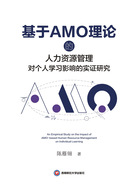
Abstract
The nature of human resource management is to transfer individual advantages into organizational advantages through effectively making use of people's ability and role in all the aspects of business operations. However, in the process of developing human potentials and using personal talents, individuals. ability, motivation, and given opportunity which are emphasized by the ability, motivation and opportunity (AMO) theory of high performance human resource management system are all indispensable factors.
Individuals cannot play an efficient role in organizations without teamwork. And individual learning is also related to communication and cooperation with others. The AMO theory-based collaboration human resource management system is the human resource management system raised by organizations to build good interpersonal relationships between their members and to effectively promote teamwork. Through using a series of human resource management practices with distinguished goals of improving the ability of collaboration, stimulating the motivation to collaborate and providing collaboration opportunities, the system helps to promote the flow and exploitation of resources and information within the organization.
Some crucial personal qualities influence individuals.learning behavior.In this study, we chose self-efficacy, intrinsic and extrinsic motivational orientations, and organizational commitment as mediators of the impact of AMO theory-based collaboration human resource management system on individual learning. This is because perceived human resource management practices with distinguished themes of ability, motivation and opportunity directly have an effect on individuals.self-recognition and inner qualities, thus influencing their attitudes and behaviors. We also chose job autonomy, task complexity, psychological safety, and environmental uncertainty as moderators in studying the impact of AMO theory-based collaboration human resource management system on individual learning.
Therefore, this study explored the influence of ability-based collaboration human resource management practices, motivation-based collaboration human resource management practices, and opportunity-based collaboration human resource management practices on individual learning, the mediating effect of self-efficacy, intrinsic and extrinsic motivational orientations, and organizational commitment, and the moderating effect of job autonomy, task complexity, psychological safety, and environmental uncertainty. We proposed related hypotheses and the theoretical model. We used questionnaires to collect the research data. We did the confirmatory factor analysis, exploratory factor analysis, hierarchical regression analysis and moderated regression analysis to test all the hypotheses in the theoretical model.
The results of the empirical analysis show that all of the ability-based, motivation-based, and opportunity-based collaboration HRM practices are significantly positively associated with individual learning, and self-efficacy, intrinsic and extrinsic motivational orientations, and organizational commitment mediate those relationships. All of the self-efficacy, intrinsic and extrinsic motivational orientations, and organizational commitment have a significant positive impact on individual learning. Task complexity negatively moderates the relationship between intrinsic and extrinsic motivational orientations and individual learning; psychological safety positively moderates the relationship between organizational commitment and individual learning; environmental uncertainty negatively moderates the relationship between intrinsic and extrinsic motivational orientations and individual learning, and positively moderates the relationship between organizational commitment and individual learning.
Key words: AMO theory; collaboration human resource management; AMO theory-based collaboration HRM; individual learning